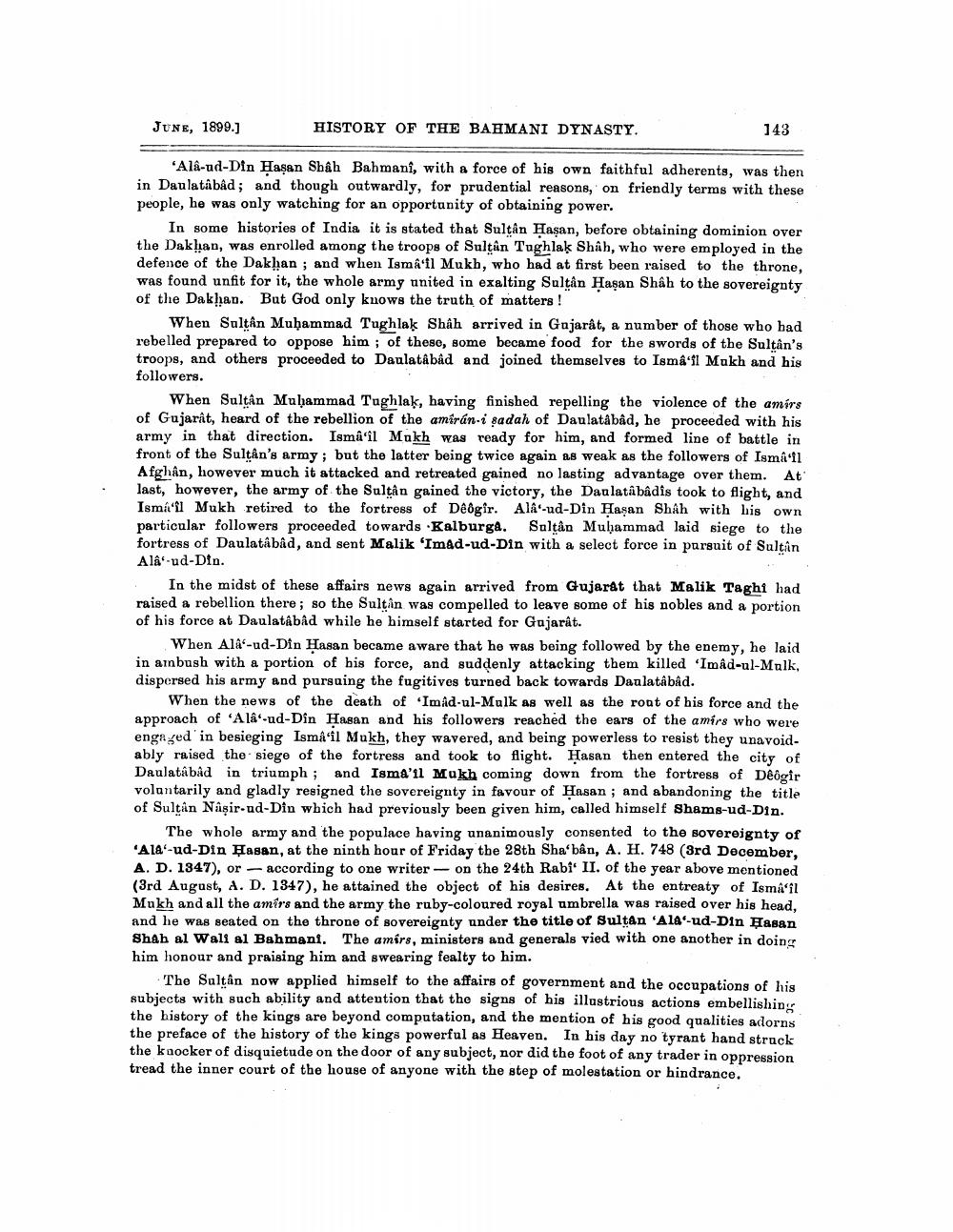________________
JUNE, 1899.]
HISTORY OF THE BAHMANI DYNASTY.
'Alâ-ud-Din Hasan Shah Bahmani, with a force of his own faithful adherents, was then in Daulatâbâd; and though outwardly, for prudential reasons, on friendly terms with these people, he was only watching for an opportunity of obtaining power.
143
In some histories of India it is stated that Sultan Hasan, before obtaining dominion over the Dakhan, was enrolled among the troops of Sultan Tughlak Shah, who were employed in the defence of the Dakhan; and when Ismail Mukh, who had at first been raised to the throne, was found unfit for it, the whole army united in exalting Sultan Hasan Shâh to the sovereignty of the Dakhan. But God only knows the truth of matters!
When Sultan Muhammad Tughlak Shâh arrived in Gujarât, a number of those who had rebelled prepared to oppose him; of these, some became food for the swords of the Sultan's troops, and others proceeded to Daulatâbâd and joined themselves to Ismail Mukh and his followers.
When Sultan Muhammad Tughlak, having finished repelling the violence of the amirs of Gujarat, heard of the rebellion of the amirán-i sadah of Daulatâbâd, he proceeded with his army in that direction. Ismail Mukh was ready for him, and formed line of battle in front of the Sultan's army; but the latter being twice again as weak as the followers of Ismâ'il Afghân, however much it attacked and retreated gained no lasting advantage over them. At last, however, the army of the Sultan gained the victory, the Daulatâbâdîs took to flight, and Ismail Mukh retired to the fortress of Dêôgir. Alâ'-ud-Din Hasan Shâh with his own particular followers proceeded towards Kalburga. Sultan Muhammad laid siege to the fortress of Daulatâbâd, and sent Malik 'Imad-ud-Din with a select force in pursuit of Sultân Alâ'-ud-Din.
In the midst of these affairs news again arrived from Gujarat that Malik Taghi had raised a rebellion there; so the Sultan was compelled to leave some of his nobles and a portion of his force at Daulatâbâd while he himself started for Gujarat.
When Ala-ud-Din Hasan became aware that he was being followed by the enemy, he laid in ambush with a portion of his force, and suddenly attacking them killed 'Imâd-ul-Mulk, dispersed his army and pursuing the fugitives turned back towards Daulatâbâd.
When the news of the death of Imâd-ul-Mulk as well as the rout of his force and the approach of 'Alâ -ud-Din Hasan and his followers reached the ears of the amirs who were engaged in besieging Ismail Mukh, they wavered, and being powerless to resist they unavoidably raised the siege of the fortress and took to flight. Hasan then entered the city of Daulatâbâd in triumph; and Ismail Mukh coming down from the fortress of Deôgir voluntarily and gladly resigned the sovereignty in favour of Hasan; and abandoning the title of Sultan Nâşir-ud-Din which had previously been given him, called himself Shams-ud-Din.
The whole army and the populace having unanimously consented to the sovereignty of 'Ala-ud-Din Hasan, at the ninth hour of Friday the 28th Sha'bân, A. H. 748 (3rd December, A. D. 1347), or according to one writer on the 24th Rabi' II. of the year above mentioned (3rd August, A. D. 1347), he attained the object of his desires. At the entreaty of Ismail Mukh and all the amirs and the army the ruby-coloured royal umbrella was raised over his head, and he was seated on the throne of sovereignty under the title of Sultan 'Ala-ud-Din Hasan Shah al Wali al Bahmani. The amirs, ministers and generals vied with one another in doing him honour and praising him and swearing fealty to him.
The Sultan now applied himself to the affairs of government and the occupations of his subjects with such ability and attention that the signs of his illustrious actions embellishing the history of the kings are beyond computation, and the mention of his good qualities adorns the preface of the history of the kings powerful as Heaven. In his day no tyrant hand struck the knocker of disquietude on the door of any subject, nor did the foot of any trader in oppression tread the inner court of the house of anyone with the step of molestation or hindrance.




